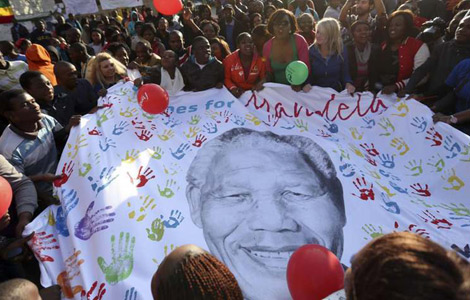Pew Poll: China will top US
Updated: 2013-07-19 11:29
By Chen Weihua in Washington (China Daily)
|
||||||||
Despite China's economic slowdown and challenges on multiple fronts, there is widespread belief globally that its economic power continues to grow and China will ultimately replace the United States as the world's dominant superpower, according to a Pew Center survey released on Thursday.
The results, based on a survey of 37,635 people in 39 countries from March 2 to May 1 this year, reflect largely the views of Pew's survey two years ago.
In 23 of the 39 nations, majorities or pluralities say China either already has replaced or eventually will replace the US as the top superpower.
The report says this view is more prevalent now than it was in 2008 when the same question was asked. Today, majorities or pluralities in only six countries believe China will never supplant the US.
Perceptions about the economic balance of power in the world have been shifting since the global financial crisis started in 2008. In surveys of 20 nations in both 2008 and 2013, the median percentage naming the US as the world's leading economic power has declined from 47 percent to 41 percent, while the median percentage putting China in the top spot has jumped from 20 percent to 34 percent.
Some of the US's closest allies in Europe have a firm belief in China's growing economic might, according to the Pew report.
For example, 53 percent in Britain said China is the leading economy, while 33 percent name the US. In Germany, 59 percent say of China occupies the top place, while only 19 percent think the US is the global economic leader.
While more people believe China's economic power is growing, many see the US as the leading economy today, the report said. This is consistent with other statistics, such as from the International Monetary Fund, which show that the US economy was nearly twice the size of China's in 2012.
Even in many countries where the US is still seen as the top economic power, most believe China will someday become the leading overall superpower, according to the Pew survey.
Meanwhile, two thirds of the Chinese believe their country either already has or someday will supplant the US, according to the report.
Americans are divided, with 47 percent saying that China has or will replace the US and 47 percent saying this will never happen.
That is a significant shift of US public opinion from 2008 when only 36 percent said China would become the top global power and 54 percent said China would never replace the US.
The survey also found that the overall global attitudes toward the US are positive, especially among Europeans. But since the poll was conducted before the breakout of Edward Snowden case, it didn't show whether revelations by the former technical contractor for the US National Security Agency (NSA) of top-secret U.S. mass surveillance programs have any effect on Europeans.
US trouble with the Muslim world is reflected in the survey, where the US gets mostly unfavorable reviews. An overwhelming majority in Egypt (81 percent), Jordan (85 percent), Palestinian territory (79 percent) and Turkey (70 percent) have negative views of the US.
Among the regions surveyed, people in the Middle East also express the lowest level of confidence in US President Barack Obama. Overall, the confidence in Obama is still high but declining. In China, it has declined from 62 percent in 2009 to 31 percent this year.
The survey also reveals that in most parts of the world, many people think the US acts in its own self-interest in global affairs, ignoring other countries.
Majorities throughout nearly all the European and Middle Eastern nations polled say the US doesn't consider the interests of countries like theirs when making foreign policy decisions.
In most of the nations polled, the majorities oppose the US drone campaign against militant leaders and organizations.
Meanwhile, China's favorability remains largely unchanged since 2007.
The majorities in countries of Indonesia, Pakistan, Malaysia and Australia have a favorable view of China. In South Korea, the favorability has come down slightly from 52 percent in 2007 to 46 percent.
In the Philippines, which has territorial disputes with China, the favorability rate is still 48 percent, while perceptions in Japan about China are largely negative. Only 8 percent have favorable views of China.
China's favorability rate is also high in the African countries of Kenya, Senegal, Nigeria, Ghana and Uganda and European nations of Greece and Russia.
Overall, 72 percent in Africa, 58 percent in Latin America, 45 percent in Middle East and 43 percent in Europe view China favorably, the report says. In the US, China's favorability rate drops to 37 percent from 42 percent in 2007.
Half or more of those surveyed see China as more of a partner for their country than as an enemy. Comparatively in the US, 20 percent call China a partner, 18 percent say enemy and 58 percent say neither.
The report says China's scientific and technological advances are the most widely appreciated aspect of its influence in both Africa (75 percent) and Latin America (72 percent).
The report also shows that China's greatest global asset in the future may be its appeal among young adults. In the US, 57 percent aged 18-29 view China positively, compared with 27 percent among people aged 50 and older.
"In 16 of the 38 nations surveyed, younger people are significantly more likely than older people to look favorably on China," the report says.
chenweihua@chinadailyusa.com
(China Daily USA 07/19/2013 page1)

 Rat, rabbit head sculptures on display
Rat, rabbit head sculptures on display
 Russia jails opposition leader
Russia jails opposition leader
 Detroit files biggest ever US municipal bankruptcy
Detroit files biggest ever US municipal bankruptcy
 Plane crash victims' parents seek answers
Plane crash victims' parents seek answers
 'Improving' Mandela marks 95th birthday
'Improving' Mandela marks 95th birthday
 Qingdao eatery finds use for pesky seaweed
Qingdao eatery finds use for pesky seaweed
 From university campus to boot camp
From university campus to boot camp
 FIFA head: World Cup in Brazil could be mistake
FIFA head: World Cup in Brazil could be mistake
Most Viewed
Editor's Picks

|

|

|

|

|

|
Today's Top News
Monetary system needs overhaul, says report
US companies seek tougher enforcement of IP laws
Syrian refugees demand help from Kerry at camp
Second iPhone shock leaves man in coma
China's government spends less in 2012
Pregnant Olympic runner dies, baby saved
Detroit files biggest ever US municipal bankruptcy
Obama weighs canceling Moscow talks with Putin
US Weekly

|

|







